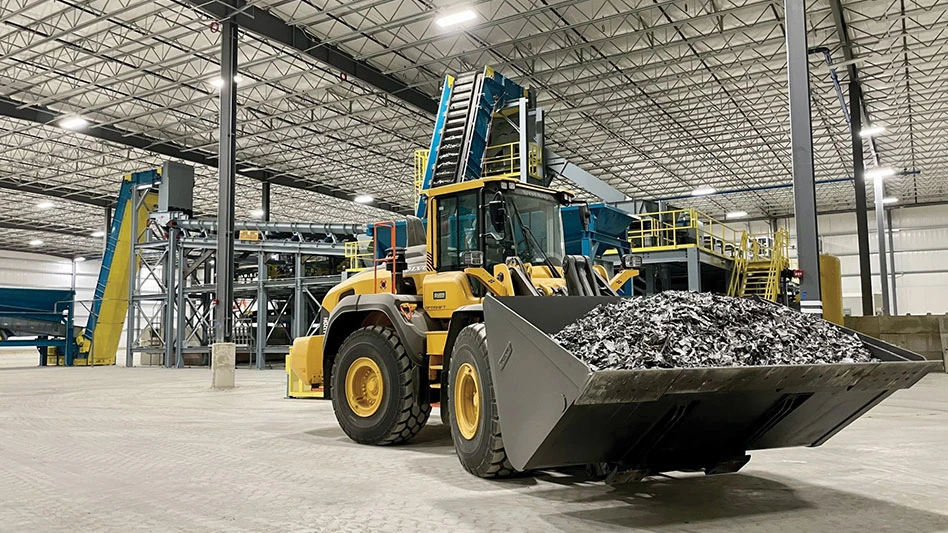
Photo courtesy of Sortera Technologies
Sortera Technologies, Markle, Indiana, is taking a different approach than other equipment manufacturers that have targeted aluminum sorting.
The company manufactures sorting equipment that uses artificial intelligence (AI), data analytics and advanced sensors to sort aluminum by alloy, but rather than sell or license its technology, it operates a sorting facility in Markle with plans to add additional facilities in the coming year.
“We look at the problem a little bit differently than our peers,” says Ben Pope, senior vice president of operations and commercial development. “We’re trying to own and operate the entire problem.”
He says Sorteracombines multiple sensors, adds AI and its own software to achieve throughput rates of 5 to 8 tons per hour of highly mixed twitch, tweak, and zorba-like materials.
“One lane of our technology will have multiple sensors,” Pope explains. "Our current system has six sensors, and those sensors are all sending data to a computer, and that computer is then making decisions.”
He adds that most of Sortera’s lines can target four or five outputs, but its new line that will be installed in the first quarter of 2025 will have the ability to do eight.
The process starts by sizing infeed material. After sizing material, Pope says independent feed systems are created that allow optimization of the flow of material through the system.
Sortera’s technology analyzes each piece, gathering 20 to 30 data points, including size, density, chemical classification and product form, which is whether it is wrought or cast material. Those data points allow Sortera to make consistent, repeatable decisions in its sorting process, Pope says.
Sortera uses its vision system to look at the form of the material first.
“We start with the form because the form is how we end up classifying the most appropriate chemical classifier for the output,” Pope says.
Sizing also is critical to the effectiveness of its process. Given its piece-by-piece approach to sorting, Sortera is targeting the highest density possible but also considering what its sensors need to see and how long they need to see it to make effective decisions. Material sized from 1 inch up to 4 inches square is the ideal size.
“What we're trying to do is minimize those overs and unders based on the technology's capability so that the industry gets the most for what they're creating, and we can keep as much material domestic as possible,” Pope says.
Pope says Sortera is selling a lot of mixed wrought aluminum alloys today based on what the mills are demanding.
“On the cast side, we're actually upgrading the cast to an alloy level. We make a 380 package [and] a 356 package.,” he says. “We're working on a 319 package right now. So, as we continue to develop these products, you're going to see us making near-specification scrap packages for all forms of aluminum.”
Sortera started by sorting twitch, which the Recycled Materials Association defines as the post-auto shredder mixed aluminum fraction derived from wet or dry media separation that contains no more than 1 percent maximum free zinc, 1 percent maximum free magnesium and 1 percent maximum of analytical iron. It is now working its way down the value stream to sort tweak, the shredded aluminum fraction generated by eddy current separation of electronic products being predominately aluminum, and zorba, a combination of the nonferrous metals aluminum, copper, lead, magnesium, stainless steel, nickel, tin and zinc.
“Our end goal will be zorba, but today we're not sorting zorba on a mass production level,” Pope says, adding that Sortera is likely 18 month to 24 months away from that.
Sortera has a tolling partnership with Novelis, but Pope says the company’s future sites will be focused on end-of-life material specifically, with the company purchasing the scrap that it will process. Those two new plants, to be located in the Southeast, will be equipped to process roughly 120 million pounds per plant.
Pope says Sortera is working with other aluminum scrap consumers in addition to Novelis.
“Obviously, we don't want to make an investment in building a facility on a field of dreams, so we're looking for partners and offtakes in all three forms of material, whether you're a flat rolled producer, an extrusion billet caster and of course the die cast industry,” he says.
“There's kind of a breadbasket of aluminum rolling mills in the Alabama, Tennessee, Kentucky region, and there's plenty of scrap in that location, so it just makes sense.”
As new aluminum melting capacity comes online in the U.S., Pope says demand for scrap will change the domestic landscape, making some grades that are not competitive today more desirable. He predicts companies will invest in sorting technology or establish partnerships to achieve the quality necessary to keep more scrap in the U.S.
“And those rolling mills will pay the right number to get those units because they have to pay back the asset,” he says.
Latest from Recycling Today
- Reconomy brands receive platinum ratings from EcoVadis
- IDTechEx sees electric-powered construction equipment growth
- Global steel output recedes in November
- Fitch Ratings sees reasons for steel optimism in 2025
- P+PB adds new board members
- BlueScope, BHP & Rio Tinto select site for electric smelting furnace pilot plant
- Magnomer joins Canada Plastics Pact
- Out of touch with reality





